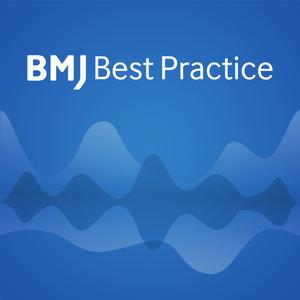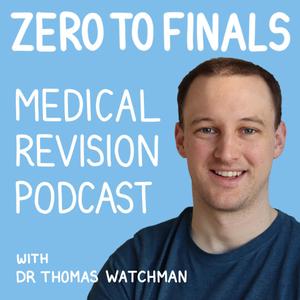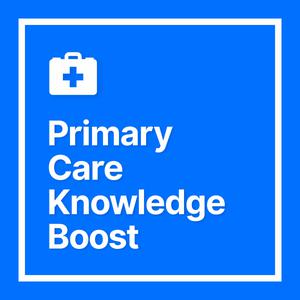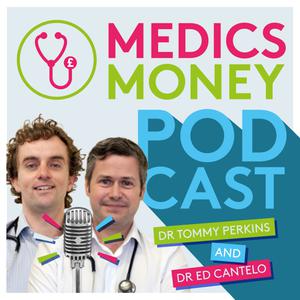
RCP Medicine Podcast
Royal College of Physicians
The RCP Medicine podcast is a discussion of different topics relevant to physicians and physician associates. Episodes discuss and explore different topics including real-life clinical cases, new evidence-based guidelines and specific physician issues in the modern healthcare environment. The views expressed in this podcast are those of the presenters and not necessarily the RCP.
- 31 minutes 36 secondsEpisode 78: Stroke and neurology
In this episode of RCP medicine podcast, Dr Zeina Al-Matlik is joined by Dr John Williamson, a consultant Neurologist and Stroke Physician working in Liverpool, to discuss one of the leading causes worldwide for disability - Strokes. Whether you are a healthcare provider, caregiver, or a stroke survivor, this podcast covers everything you need to know about the vital ins and outs of stroke.
This episode unpacks essential topics such as recognizing the warning signs of strokes and acting FAST, ( Face, Arm, Slurred speech, Time - acronym used for identification of potential stroke), understanding the difference between TIAs ( Transient Ischemic Attacks) and Ischemic and haemorrhagic strokes and their managements, prevention of strokes including lifestyle and medical modifications of risk factors, and finally discussing common Stroke mimics and how to recognize them. Listeners will also get a chance to explore the latest breakthrough advancements and guidelines in stroke research and treatments such as life saving thrombolysis - also known as clot busting medication and thrombectomies - whereby a catheter is inserted into blood vessel to help retrieve and remove clots.
This episode is designed to educate, empower, and provide practical tips for both healthcare providers and patients to spread awareness, understand strokes and take prompt action to improve outcomes as Time is brain. 🧠
Resources
National Clinical Guideline for Stroke for the UK and Ireland - https://www.strokeguideline.org/
Functional Neurological Disorder (FND) - https://neurosymptoms.org/en/
Music by bensound.com20 December 2024, 6:00 am - 51 minutes 58 secondsEpisode 77: Sustainable QI
In this episode of RCP Medicine podcasts, Dr Rebecca Kuruvilla discusses Sustainability in Quality Improvement, also known as the SusQI Framework with Dr Ayoma Ratnappuli. Ayoma is an HIV/Genitourinary Medicine specialist registrar working in South London has an out of programme experience with the Centre for Sustainable Healthcare as an Education Fellow, a role she now continues with alongside her clinical training. The Centre for Sustainable Healthcare works to embed and spread SusQI into undergraduate and postgraduate education as well as healthcare delivery organisations
The SusQI Framework aims to deliver the best possible health outcomes with minimal financial and environmental costs whilst adding positive social value at every opportunity. This framework has been pioneered by the Centre for Sustainable Healthcare. During their conversation Ayoma breaks down the steps of the SusQI framework, explains the benefits of using this alongside traditional QI methodology, and explores an example of one of Rebecca’s own QI projects and how it could be adapted to add more sustainable value.
Resources
CSH Courses Courses | Centre for Sustainable Healthcaree-learning for Health – Environmentally Sustainable Healthcare Environmentally Sustainable Healthcare - elearning for healthcare (e-lfh.org.uk)
SusQI.org (step by step guide) Step-by-step guide | Centre for Sustainab (susqi.org)
Greener NHS Greener NHS (england.nhs.uk)
CSH Resource Library Resource library | Sustainable Healthcare Networks Hub
CSH Networks Networks | Sustainable Healthcare Networks Hub
This episode was funded by Vertex Pharmaceuticals (Europe) Limited. Vertex had no involvement in the creation and elaboration of this episode and all views and opinions expressed by the presenter and guests are solely their own.
Music: bensound.com
29 November 2024, 4:00 am - 38 minutes 4 secondsEpisode 76: Smoking and vaping
In this episode of RCP Medicine podcasts, Dr Rebecca Kuruvilla discusses e-cigarettes and vaping with the RCP’s special advisor on Tobacco, Professor Sanjay Agrawal. It is an area that many physicians are unclear on how to advise their patients on. In this episode, Sanjay aims to shed a light on e-cigarettes and their role on health and he will also discuss the recent report he has co-authored “E-cigarettes and harm reduction: an evidence review” for the RCP. Sanjay will explain how we should be advising our patients on e-cigarettes looking at the current evidence.
Sanjay is a Consultant in Respiratory and Critical care medicine at the University Hospitals of Leicester NHS Trust. He has a specialist interest in treatment of tobacco dependency and NHS financial management, alongside clinical care for patients with interstitial lung disease, lung cancer and patients with critical illness. Sanjay Chairs the RCP Tobacco advisory group and is the National Speciality Advisor on Tobacco to NHS England.
This podcast has been made with an educational grant from Bristol-Myers Squibb Pharmaceuticals Limited (“BMS”). BMS has had no input or involvement in the design, development or content of the podcast whatsoever.
Music: bensound.com15 November 2024, 4:00 am - 54 minutes 51 secondsEpisode 75: Health Inequalities and Corporate Influence: Unveiling the Food Industry's Impact
In this episode of the RCP Medicine podcast's Health Inequalities series, Dr. Rohan Mehra delves into the commercial determinants of health—how private sector activities influence health outcomes and deepen inequalities. This episode focuses on the food industry, examining how corporate actions like product design, marketing, and lobbying can negatively impact public health.
Joining Rohan is Dr. Chris Van Tulleken, an infectious diseases consultant at the Hospital for Tropical Diseases in London, associate professor at University College London, and an acclaimed researcher and BAFTA wining broadcaster. Chris’ work, including his bestselling book Ultra-Processed People, shines a light on how corporations, particularly in the food industry, affect health, especially in the context of child nutrition. Together, they explore the pressing issue of corporate influence on health and discuss practical ways to address these challenges.
Resources:
Lancet commercial determinants of health series:
https://www.thelancet.com/series/commercial-determinants-health
Commercial determinants of health- WHO fact sheet
https://www.who.int/news-room/fact-sheets/detail/commercial-determinants-of-health
LSHTM research on commercial determinants of health (CDRG workgroup)
https://www.lshtm.ac.uk/research/centres-projects-groups/cdrg
Music: www.bensound.com24 October 2024, 11:00 pm - 35 minutes 50 secondsEpisode 74: Osteoporosis
Osteoporosis
Listen along to Dr Sagen Zac-Varghese, Dr Amy Purohit and Dr Elinor Roderick as they discuss osteoporosis.
They discuss identifying people with osteoporosis, investigating for causes of falls and secondary causes of osteoporosis, use of FRAX, understanding bone mineral density, and, management to reduce fracture risk, including diet, exercise and medications.
Sagen Zac-Varghese is a consultant in diabetes, endocrinology and general internal medicine and lead for undergraduate students at the East and North Herts NHS Trust. She is the RCP education representative for the RCP Advisory Group on Nutrition Weight and Health.
Elinor Roderick is an academic foundation doctor at the East and North Herts Trust.
Amy Purohit is an academic foundation doctor at the East and North Herts Trust.
LinksRoyal Osteoporosis Society
National Osteoporosis Guideline Group
FRAX
https://frax.shef.ac.uk/FRAX/
music: bensound.com10 October 2024, 11:00 pm - 28 minutes 59 secondsEpisode 73: Hyponatraemia (a five-step approach)
Listen along to Dr Sagen Zac-Varghese and Dr Elinor Roderick as they discuss hyponatraemia. Using analogies and a structured framework (a five-step approach), they talk you through diagnosing and managing people with hyponatraemia, walk you through a case and, illustrate how to discuss this with your patients.
Sagen Zac-Varghese is a consultant in diabetes, endocrinology and general internal medicine and lead for undergraduate students at the East and North Herts NHS Trust. She is the RCP education representative for the RCP Advisory Group on Nutrition Weight and Health.
Elinor Roderick is an academic foundation doctor at the East and North Herts Trust.
LinksEuropean Society of Endocrinology Clinical guideline for the management of hyponatraemia
Society for Endocrinology Emergency management of severe and moderately severely symptomatic hyponatraemia in adult patients
https://www.endocrinology.org/media/xhrhxhxm/emergency-management-of-severe-and-moderately-severely-symptomatic-hyponatraemia-in-adult-patients-2022.pdf
Music: bensound.com27 September 2024, 5:00 am - 1 hour 11 minutesEpisode 72: Pandemic Preparedness: Are We Ready for the Next Global Threat?
In this episode of the RCP Medicine podcast, Dr Rohan Mehra, an Infectious Diseases and Microbiology registrar with an interest in conflict and catastrophe medicine, delves into the critical issue of pandemic preparedness. As we reflect on the challenges faced during the COVID-19, and other pandemics, the question remains: how ready are we for the next inevitable outbreak? Joining Dr. Mehra is Professor Tom Solomon, a leading expert with nearly three decades of experience in emerging infections.
Professor Solomon is the Professor of Neurological Science and Head of the Brain Infections Group at the University of Liverpool. He led the University of Liverpool’s Institute of Infection and Global Health and founded the National Institute for Health Research (NIHR) Health Protection Research Unit in Emerging and Zoonotic Infections. His work has been pivotal in responding to Ebola, Zika, COVID-19, and mpox (formerly monkeypox).
As Director of The Pandemic Institute in Liverpool and Vice President (International) of the Academy of Medical Sciences, Professor Solomon is a leading expert in pandemic preparedness. He also engages with the public through his media appearances and the Scouse Science Podcast.
Together, they explore the lessons learned from past pandemics and discuss what needs to be done to safeguard our future.
Links and resources:
The pandemic institute
https://www.thepandemicinstitute.org/
The WHO pandemic hub
CEPI (coalition for epidemic preparedness Innovations)
https://cepi.net/
Music: bensound.com6 September 2024, 5:00 am - 42 minutes 13 secondsEpisode 71: Women in healthcare-disparities in medicine and leadership
Listen to Dr Rohan Mehra, RCP clinical education fellow, (Infectious diseases/microbiology SPR) and Dr Mumtaz Patel, as they shine a spotlight on female leadership in healthcare. They discuss many of the issues facing women in leadership position within healthcare and the challenges faced in reaching those positions. Inequality remains deeply engrained within the healthcare workforce and urgently needs addressed and Mumtaz and Rohan outline how this could be done.
Dr Mumtaz Patel is a consultant in nephrology in Manchester as well as senior censor and vice president for education performing presidential duties including chair of council for the RCP. Mumtaz previously launched a global women leaders programme, on which she remains an active educator, which empowers female physicians to advance into leadership roles, which continues to be hugely successful to this day. This programme aims to narrow the gender leadership gap globally and is tailored to a local context to address these issues in smart sustainable targeted ways. It is also aligned to the Emerging women’s leaders programme which focuses on the same issues within the UK which Mumtaz has also been instrumental in creating. Mumtaz also recently won the prestigious ‘Outstanding Leader award’ at the Global women in Healthcare awards.Resources:
References:
- Female global health leadership: data-driven approaches to close the gender gap. Lancet 2019; 393: 521-523.
- Downs JA, Reif LK, Hokororo A, Fitzgerald DW. Increasing women in leadership in global health. Acad Med 2014; 89: 1103–07.
- HRH Global Resource Center. Resource spotlight: gender and health workforce statistics. https://www.hrhresourcecenter.org/gender_stats (accessed Dec 25, 2020).
- Kwedi Nolna SK, Essama Mekongo PE, Leke RGF. Mentoring for early-career women in health research: the HIGHER Women Consortium approach. Glob Health Epidemiol Genom 2017; 2: e3.
- https://www.who.int/docs/default-source/health-workforce/en-exec-summ-delivered-by-women-led-by-men.pdf
- Linkage Inc, Intersectionality in the Workplace and the Advancement of Women Leaders, 2020
- Power, privilege and priorities
- Boylan J, Dacre J, Gordon, H. Addressing women’s under-representation in medical leadership. Lancet, 2019, Volume 393: e14.
- Ferry G. Inspirational women in medicine. Lancet 2017; 390: 1825.
- RCP strategy 2022-24
- RCP global strategy
- RCP - A 2020 Vision
- World Economic Forum. Global gender gap report, 2018.
This episode was funded by Vertex Pharmaceuticals (Europe) Limited. Vertex had no involvement in the creation and elaboration of this episode and all views and opinions expressed by the presenter and guests are solely their own.
Music: bensound.com2 August 2024, 4:00 am - 48 minutes 25 secondsEpisode 70: Health inequalities and Race
Listen to Dr Rohan Mehra, RCP clinical education fellow, (Infectious diseases/microbiology SPR) and Professor Habib Naqvi as they highlight health inequalities that exist due to race and what you can do to improve this situation. Sadly, racism is still pervasive in society and healthcare is not immune from this and needs urgently addressed. They explore some of the inequalities that exist due to race, how they need to be tackled and what you can do in your daily practice to try and address these ongoing challenges.
Professor Habib Naqviis Chief Executive of the NHS Race and Health Observatory in the UK, which works to identify and tackle ethnic inequalities in healthcare by facilitating evidence, making health policy recommendations, and enabling long-term transformational change. Habib has worked in healthcare for 25 years, he’s spoken and written widely on health equity and was awarded an MBE in the 2019 Queen’s Birthday Honours for services to equality and diversity in the NHS. Habib is listed in the Health Service Journal’s ‘100 most influential people in health’.
Further information on the NHS Race and Health Observatory can be found here: https://www.nhsrho.org/
Music by bensound.com
This podcast has been made with an educational grant from Bristol-Myers Squibb Pharmaceuticals Limited (“BMS”). BMS has had no input or involvement in the design, development or content of the podcast whatsoever.15 July 2024, 4:00 am - 30 minutes 20 secondsEpisode 69: Medical practice in adults with a learning disability
Listen to Dr Charly Annesley (Consultant Learning Disability physician) and Dr Rebecca Kuruvilla (RCP clinical education fellow and Clinical Pharmacology and GIM registrar) discuss health inequalities in the population of patients living with a learning disability and why we need more physicians who are trained in this area of medicine. They also talk to Dr Alex Tyler who is an ST6 registrar in Geriatrics and GIM who is completing a PG certificate in Medical Practice in Adult Learning Disability.
Dr Charly Annesley is a consultant learning disability physician. She works at North Middlesex University hospital in London, having set up the first and only post of its kind in the country. She is also an honorary clinical lecturer and course lead for a postgraduate certificate in Learning Disability Medicine that is run with the RCP and Edge hill university.
Links:
Training Programme to meet the Medical Needs of Adults with a Learning Disability | RCP LondonBTS clinical statement on aspiration pneumonia | Thorax (bmj.com)
BTS Clinical Statement on the prevention and management of community-acquired pneumonia in people with learning disability | Thorax (bmj.com)
Master LeDeR 2023 (2022 report) (kcl.ac.uk)
RCP Toolkit: Acute medical care for people with a learning disability
This podcast has been made with an educational grant from Bristol-Myers Squibb Pharmaceuticals Limited (“BMS”). BMS has had no input or involvement in the design, development or content of the podcast whatsoever.
Sound by bensound.com14 June 2024, 5:00 am - 35 minutes 45 secondsEpisode 68: Inequalities in healthcare - differential attainment
Listen to Dr Rohan Mehra, RCP clinical education fellow, (Infectious diseases/microbiology SPR) and Dr Mumtaz Patel, as they shine a spotlight on differential attainment in healthcare. This is a pervasive issue within UK healthcare which requires work from everyone. Here Rohan and Mumtaz illustrate the issue, how it impacts people and what you can do to try and make a difference.
Dr Mumtaz Patel is a consultant in nephrology in Manchester as well as Senior censor and Vice President for education for the RCP. Mumtaz led nationally on the research around Differential Attainment for over 5 years and has led cross-collaborative research across organisations such as GMC, NHSE, royal colleges and within different specialties with a focus on earlier interventions and support to improve educational outcomes and trainee experience. Mumtaz has helped produce national guidance around supporting trainers and trainees in addressing and narrowing the Differential attainment gap. This work has had national and international recognition with presentations at multiple conferences.
Resources:
GMC: tackling differential attainment.
Academic papers highlighting differential attainment and steps that need taken:
Woolf K, Potts HW. Ethnicity and academic performance in UK-trained doctors and medical students: systematic review and meta-analysis. BMJ 2011;342:d901.
Regan de Bere S, Nunn S, Nasser M. Understanding differential attainment across medical training pathways: a rapid review of the literature Final report prepared for The General Medical Council. 2015. https://www.gmc-uk.org/-/media/documents/gmc-understanding-differential-attainment_pdf-63533431.pdf
Woolfe K, Rich A, Viney R, Needleman S, Griffin A. Perceived causes of differential attainment in UK postgraduate medical training: a national qualitative study. BMJ Open 2016;6:e013429
https://www.gmc-uk.org/education/14105.asp
Hawkridge A, Molyneux D. (2019) A description and evaluation of an educational programme for North West England GP trainees who have multiple fails in the Clinical Skills Assessment (CSA). Education for Primary Care. 30(3):167-172.
Jeremy Brown, Liam Jenkins, John Sandars, Julie Bridson, Mumtaz Patel (2023) Evaluation of the Impact of the Workshop ‘EQiT – Embedding Compassionate, Courageous, Cross-cultural Conversations into Training’ General Medical Council
Jeremy Brown, Liam Jenkins, John Sandars, Julie Bridson, Mumtaz Patel (2023) Evaluation of the impact of the Royal College of Psychiatrists Clinical Assessment of Skill and Applied Knowledge masterclass on reducing the attainment gap General Medical Council
Academy of Medical Royal Colleges, 2023 Principles for exam preparation, feedback and support for candidates to address the awarding gap.
Patel, M. Differential Attainment and implementing successful strategies, RCP commentary 2023, https://70b706f2.flowpaper.com/CommAugust2023v2/#page=18
This episode was funded by Vertex Pharmaceuticals (Europe) Limited. Vertex had no involvement in the creation and elaboration of this episode and all views and opinions expressed by the presenter and guests are solely their own.
Music by Bensound.com7 June 2024, 5:00 am - More Episodes? Get the App
Your feedback is valuable to us. Should you encounter any bugs, glitches, lack of functionality or other problems, please email us on [email protected] or join Moon.FM Telegram Group where you can talk directly to the dev team who are happy to answer any queries.
 The Resus Room
The Resus Room
 BMJ Best Practice Podcast
BMJ Best Practice Podcast
 The Zero to Finals Medical Revision Podcast
The Zero to Finals Medical Revision Podcast
 Primary Care Knowledge Boost
Primary Care Knowledge Boost
 GPnotebook Podcast
GPnotebook Podcast
 Medics Money podcast
Medics Money podcast